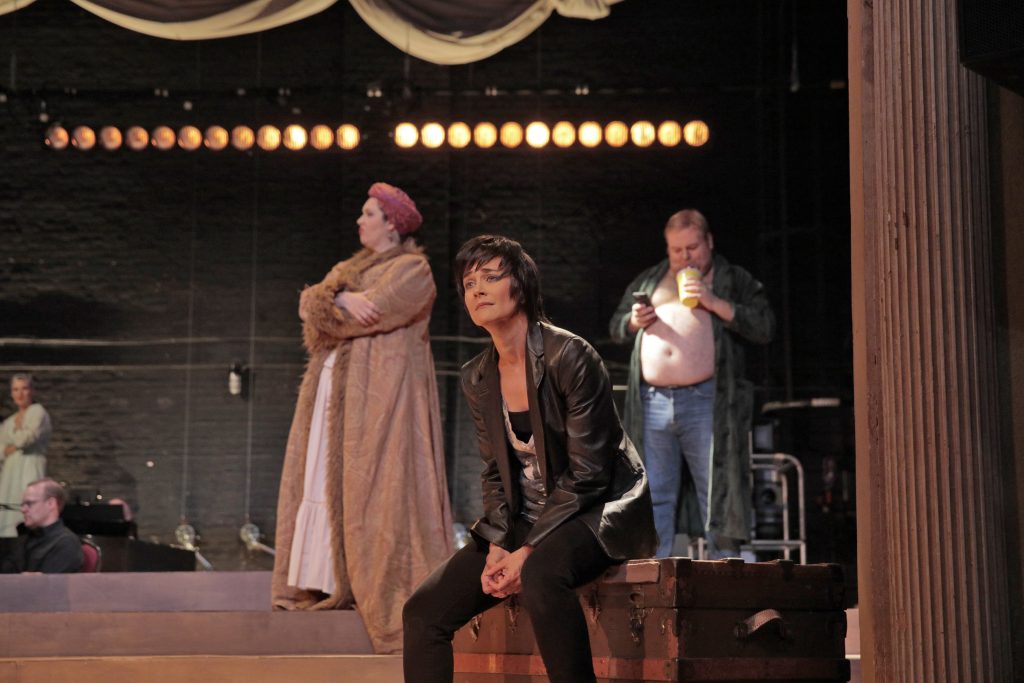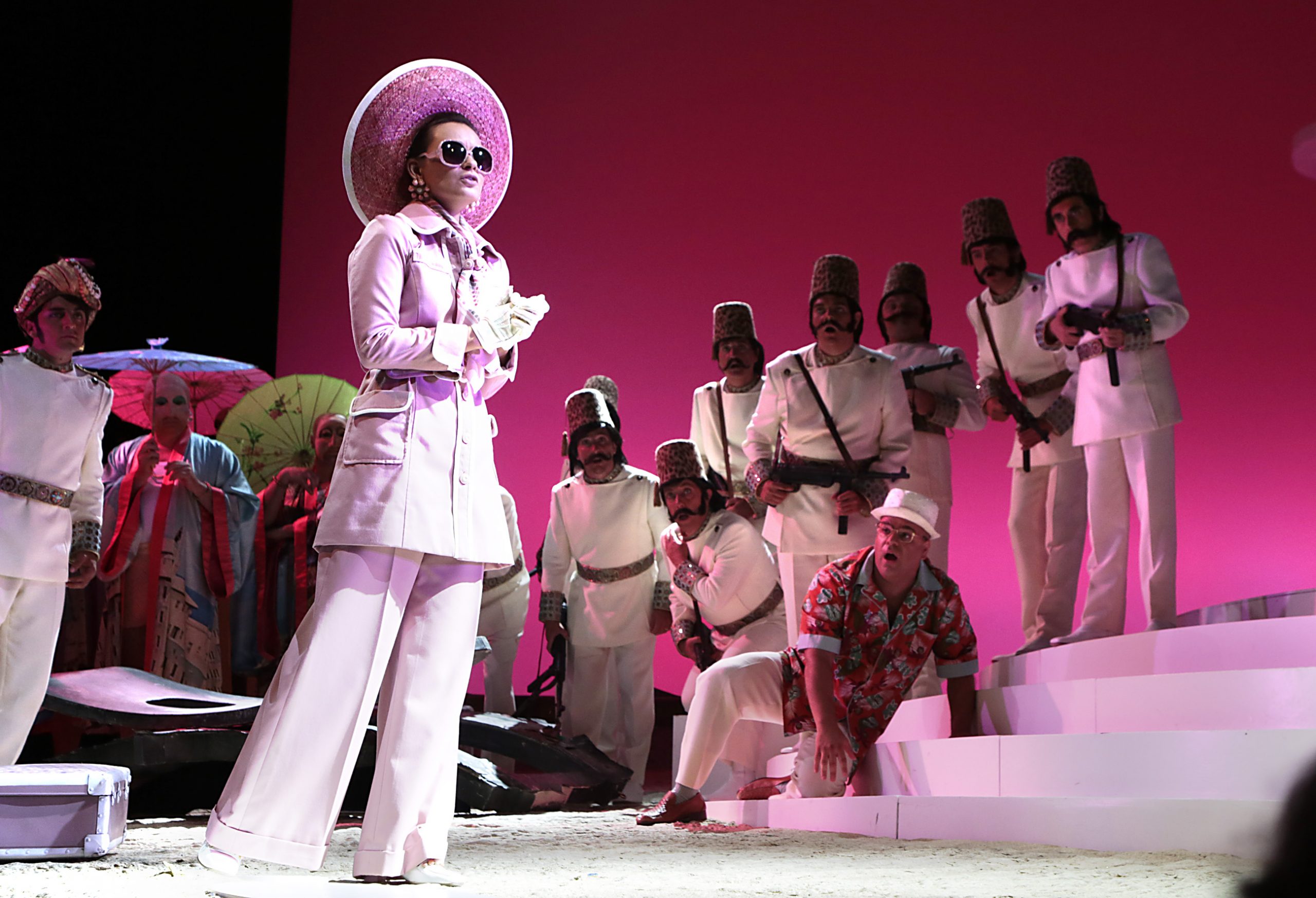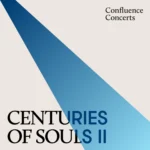REVIEW: Richard Strauss’ Ariadne auf Naxos in a new production at the Berkshire Opera Festival.
It’s a backstage story as only Richard Strauss and his invaluable and (more or less) constant collaborator Hugo von Hofmannsthal could tell it.
The Berkshire Opera Festival, now in its second season, is offering a vibrant and thoroughly engrossing production of Richard Strauss’ unique 1916 melding of the sublime and the ridiculous – Ariadne auf Naxos – now at the Colonial Theatre in Pittsfield, Massachusetts, through Friday, September 1 (performances August 26, August 29 and September 1, all at 7:30 p.m.; viewed here opening night, August 26), and it’s a musical, metaphysical and seriocomic adventure not to be missed.
I’ll Take Mine with Everything
There’s a Sondheim lyrics from A Funny Thing Happened on the Way to the Forum: “Tragedy tomorrow, comedy tonight!”
Well, how about we just have them both together? Mull that, and you’re onto the basic structural legerdemain of Ariadne auf Naxos, a trick that pulls comic and philosophic gold out of thin air.
The story’s premise is that a rich eccentric – referred to in this production as “The Boss” – has commissioned not one but two performing troupes to provide after-dinner entertainment for the guests at his lavish soiree. One group will present a newly composed tragic opera entitled Ariadne auf Naxos, based on Hesiod’s classic telling of a Greek maiden jilted by her lover, Theseus, and left to languish on a desert island.
The other group, a band of Italianate commedia dell’arte players noted for their zany, lowbrow antics and lazzi, will perform one of their sketches about amorous leading lady, Zerbinetta, and her ragtag assortment of goofy suitors.
Sounds like a well-rounded menu. But the glitch is that dinner has run overtime. So, to accommodate a non-negotiable hard-stop of 9 o’clock (when a monster fireworks display is slated to go off), the quirky and imperious Boss has decided that the two troupes will perform simultaneously.
Crazy? Perhaps. But the Boss is footing the bill, so there’s no arguing the matter.
It’s a recipe for disaster – or for boffo hijinks. And while the serious young opera composer is apoplectic, his mentor beside himself, the operatic prima donna outraged, and the tenor hating his wig, the imperturbable Zerbinetta thinks it all sounds swell. Seizing the reins, she sportively persuades the composer to cut down his opera to accommodate her and her troupe, insisting that any dismal tale of a lovelorn heroine pining for death on a beach can only be enhanced by the introduction of her own brand of earthy counsel and her co-stars’ trademark buffoonery – think Isolde meets Gilligan’s Island.
The Midas Touch
Berkshire Opera Festival co-founder and general director Jonathon Loy has directed this Ariadne auf Naxos with deft insight and consummate theatrical flair.
Dividing the evening’s two parts – the “Prologue,” played in contemporary casual dress as a first act followed by intermission, and the ensuing, longer one-act “Opera” which shows the actual performance of Ariadne auf Naxos, replete with the intrusions of Zerbinetta’s commedia troupe – Loy achieves precisely the requisite shifts of style and nuance. The Prologue is a zesty slice-of-showbiz-life (think of an extended riff on Cole Porter’s “Another Op’nin’, Another Show,” or the more deliriously turbulent behind-the-scenes sequences of The Band Wagon); while the “Opera,” which an audience might, not unreasonably, expect to be a slapstick fiasco, instead unfolds as a moving feat of theatrical alchemy.
Two on a Match
A work of sui generis structural ingenuity, Ariadne auf Naxos is delicious not only for its mashup of genres, but for the heterogeneity of personalities from which it sprang.
Hugo von Hofmannsthal – playwright, poet, philosopher – came up with the initial notion for Ariadne, and pitched it to Strauss. But, while the two had already collaborated importantly on both the controversial Elektra and the wildly successful Rosenkavalier, their tastes and temperaments were by all accounts (including their own) so different that Hofmannsthal had to work hard, via a sustained assault of alternate nagging and cajolery, to convince Strauss – the avowedly more prosaic and bourgeois of the two – to give Ariadne a go.
It finally worked.
“When two men like us set out to produce a trifle like this,” Hofmannsthal wrote to Strauss, “it has to become a very serious trifle.” In this they did not fail. What in lesser lands might have yielded something as ephemeral as sitcom instead became a vehicle for rich dialectic discourse – what is music, what is art, what is love? – a correlative, in some respects, to what G.B. Shaw often accomplished in traducing the conventions of stage comedy.
Yet Ariadne auf Naxos is so multivalent – so profuse of ideas, titillations, heroic sublimities and musical luxuriance – that it invites enjoyment on many levels. One will not want for rumination, if that’s to taste; but mere passive immersion in the giddiness, the grandeur, the sheer vocal and orchestral opulence of the evening isn’t a bad way to go, either.
It Takes All Kinds
The dramatis personae of Ariadne auf Naxos are structured essentially as three sets of paired principals, plus a colorful cadre of supporting players; and director Jonathon Loy has assembled a sterling cast.
Baritone Kyle Pfortmiller, as A Music Teacher (the putative mentor and sponsor of the young composer of Ariadne auf Naxos) admirably kicks the action into gear, offering an energized performance of expertly modulated bluster, bustle and agitation. He calls his players to order, then rails against The Producer (the Boss’ loutish axe-man) for the peremptory change of plan. Pfortmiller musters tones of rich, russet-red pique in a role that might be construed, at least in part, as a stand-in for Strauss himself, given the latter’s own clashes and compromises with management over the years. Pfortmiller admirably negotiates the balance of cynical concession and high aesthetic dudgeon.
The Producer, a spoken role, is played by noted Berkshire-area actor Chuck Schwager. Outfitted in a black sharkskin suit of remarkably oleaginous sheen, Schwager offers a regaling and transgressive turn, speaking in decidedly New-York-inflected English against the Music Teacher’s elegantly sung (if utterly inflamed) German. Indeed, Schwager’s specially jiggered dialogue here even features a hearty dose of what will be tantamount to catnip for political-humor junkies. References, for instance, to “Fakes News” leave little doubt as to just who the otherwise unnamed and unseen “Boss” of the evening really is.
Mezzo-soprano Adriana Zabala, in the trouser role of The Composer, gives a passionate, lithe, exasperating, and utterly Byronic portrait of the artist as a young egotist. Her vibrant, throbbing, white-hot vocalism is ribbed with steel in the role’s moments of unsurpassed indignation, yet melts into translucent rapture as the character succumbs to the charm and blandishments of the coquette Zerbinetta.
For her part, soprano Nicole Haslett renders the commedia queen, Zerbinetta, with prismatic variety, her voice as sparkling as sun-spray in passages of pert flirtation or flights of florid erotic enthusiasm, yet shaded in humid tones of heliotrope for the character’s more sensual come-hithers. Indeed, the ravishing Zerbinetta/Composer duet that climaxes the Prologue is here rendered sizzlingly memorable via the exquisite vocal chemistry between Haslett and Zabala.
The roles of The Tenor who plays the god Bacchus in the latter part of the evening, and The Prima Donna who becomes the eponymous Ariadne, are majestically realized here by, respectively, robust, seasoned heldentenor Kevin Ray, and megawatt soprano Marcy Stonikas.
Stonikas is thoroughly captivating as the forsaken heroine cast upon a morbid strand by her faithless lover, her voice itself a preternaturally lush and rolling seascape of sound and fury as she renders the gorgeous, expansive liebestod “Ein Schönes war” with which Strauss brilliantly furnishes her.
Later, joined by Ray as the smitten god Bacchus (whom Ariadne initially mistakes for Death incarnate), Stonikas’ voice shimmers with dark, iridescent emotion. Together, she and Ray scale with elegant mastery every inch of Strauss’ slow-burn Wagnerian pastiche, achieving precisely the surprising mystical transcendence at which the evening had secretly been aimed, right from its deceptively comic start.
In other roles, the nymph trio of soprano Jeni Houser (playing Naiad), mezzo Rebecca Ringle (Dryade), and soprano Christine Lyons (Echo) provides what amounts to sonic nectar as their voices merge in sympathy with the long-suffering Ariadne.
Zerbinetta’s brace of buffo collaborators – baritone Samuel Schultz (Harlequin), tenor Chris Carr (Scaramuccio), bass-baritone Matthew Scollin (Truffaldino), and tenor Spencer Viator (in dual roles as the Dance Master and Brighella) – all score with superb vocal panache and hilarious physical bravura.
Berkshire Opera Festival artistic director Brian Garman conducts the excellent festival orchestra with flawless precision and full mastery of Strauss’ expansive range and glowing rapture.
The visually arresting physical production – exploiting the gritty behind-the-scenes glamor of the Colonial Theatre’s bare brick-walled stage for the Prologue, then transforming into a sumptuous Martian-carmine cave-scape for the evening’s second’s part – is the handiwork of scenic designer Stephen Dobay and lighting designer John Froelich.
Costumes are by Charles R. Caine, with hair and make-up design by Beckie Kravetz.
The evening’s often frolicsome kinetics do credit to choreographer Sara Erde.
That’s Life!
Tragedy commingling with comedy – sounds a lot like life. And when all’s said, perhaps that’s just what Hofmannsthal and Strauss had in mind – a theatrical metaphor for the texture of life itself.
The Berkshire Opera Festival has again mounted an important and challenging operatic masterpiece with gorgeous resourcefulness, canny stage sense, impeccable musicality and a world-class performing ensemble.
Kudos, too, to the company for its stirring practice of playing the U.S. national anthem before each performance; and a word of appreciative goodwill to the majority of the audience who proudly stood in salute.
The Berkshire Opera Festival production of Ariadne auf Naxos, with music by Richard Strauss and libretto by Hugo von Hofmannsthal, directed by Jonathon Loy with musical direction by Brian Garman, plays at the Colonial Theatre in Pittsfield, Massachusetts on August 26 and 29 and September 1, 2017, all at 7:30 p.m. Additional information about the production, the festival, and ticket availability is available at https://www.berkshireoperafestival.org/
The post Ariadne auf Naxos at the Berkshire Opera Festival: a Girl, a God, a Bunch of Gags appeared first on my/maSCENA.
Source: Opera stories from La Scena














